
Obedience to Government
How Should We Relate to the Governments of Men?
We live in a world fraught with much confusion on all sides … confusion that has been fostered by the present god of this world, Satan the devil. He desires that we follow him and his ways of lawlessness, lies, and deception, so we can expect that the present lifestyles that governments around us are encouraging are in error.
This is a very important matter for Christians to understand, because whomever we consider to be God’s ordained leaders has everything to do with our conduct, how we treat others and ourselves. Let us take a journey into this crucial topic and see what our heavenly Father desires for us when relating to government … that of man, and that of God.
What is government? Webster defines the word as follows (M. Agnes, editor, Webster’s New World College Dictionary, Fourth Edition, Wiley Publishing, Inc., Cleveland, Ohio, 2004).
Government. “A system of ruling, controlling, etc.; an established system of political administration by which a nation, state, district, etc., is governed.” Govern implies the exercise of authority in controlling the actions of the members of a body politic and directing the affairs of state, and generally connotes as its purpose the maintenance of public order and the promotion of the common welfare.
Thus we see that government is a system of authority designed to direct and control the actions of others. It is an unseen construct placed into people’s hearts and minds to direct them in the way they should behave. In order to do this the government, or state, must fabricate a set of laws that show people the way to live … essentially illuminate the path they must follow as determined by the people in authority. Government is thus a system of people ruling over other people, with the purported goal of “controlling the actions of the body politic” — that is, the citizens of the nation — to “maintain public order and promote the common welfare.”
Those ideals placed in the hearts of men create the very substance of living, the limits of conduct by which people work, play, raise up families, order their communities and commerce, and order just about everything else in day-to-day living. Government is an idea in the hearts and minds of men. It is coded for in a constitution of some sort.

The Nature of Man’s Governments
Who, then, places these ideas in people’s minds and hearts? With the devil being the “god of this world” (II Corinthians 4:4), the answer is clear in today’s world: the devil himself wishes to fill people’s minds and hearts with his thoughts, which are based on lawlessness, even when those thoughts might contradict the nation’s constitution.
“Now the works of the flesh are evident, which are adultery, fornication, uncleanness, lewdness, idolatry, sorcery, hatred, contentions, jealousies, outbursts of wrath, selfish ambitions, dissensions, heresies, envy, murders, drunkenness, revelries, and the like …” (Galatians 5:9-21).
These thoughts and actions run contrary to the fruits of God’s spirit working within a person, those fruits being love, joy, peace, patience, kindness, goodness, faithfulness, gentleness, and self-control (Galatians 5:22-23). It is therefore safe to say that, while most leaders in government understand that the fruits of God’s spirit are correct and worthy to be followed, and are usually incorporated into their nation’s constitution, the constant undercurrent of political leaders is to encourage the works of the flesh, for Satan influences leaders as much as he can.
The evidence for Satan’s influence within governmental circles is obvious. That hold on leadership is shown through the fear and force that leaders exercise to maintain their influence. We have not far to look for examples of such totalitarian rule: Adolph Hitler, Mao Tse Tung, Idi Amin, Fidel Castro, and Joseph Stalin, to name a few from the past, and in today’s world Kim Jong-un (North Korea), Xi Jinping (China), Nicolas Maduro (Venezuela), Vladimir Putin (Russia), Ali Khamenei (Iran), and Miguel Diaz-Canel (Cuba). Other leaders lean towards dictatorial rulership, such as Justin Trudeau (Canada), Joe Biden (United States), Barak Obama (former U.S. president), Vladimir Putin (Russia), Alexander Lukashenko (Belarus), Felix Tshisekedi (Congo), Daniel Ortega (Nicaragua), Recep Erdogan (Turkey), Nguyen Trong (Viet Nam), and many others. Their colors were recently shown once the opportunity to exercise domination presented itself during the so-called pandemic lockdowns and restrictions.
Governments of men and their top-down, oppressive tendencies can be pictured as shown below, along with the various degrees of suppression by differing systems. There are many ways to define and group governmental type; this is just one of them.

Jesus Christ summed up the nature of man’s governments when He told the disciples,
“The kings of the gentiles exercise lordship [katakurieuo, ‘to exercise or gain dominion over, to lord it over’] over them, and those who exercise authority over them are called benefactors [euergetes, ‘a worker of good’]” (Luke 22:25).
These oppressive dictators actually believe they are doing good to the people by forcing them to toe the line — even killing them in some cases for small infractions. Like the devil who inspires them, they are transformed into “angels of light” (II Corinthians 11:14) who believe they are actually doing good by oppressing others to follow their unlawful dictates … calling good evil, and evil good (Isaiah 5:20).
This evil spirit being does indeed hold the world’s nations in his grasp, as he acknowledged to Jesus Himself during the wilderness temptation.
“Then the devil, taking Him up on a high mountain, showed Him all the kingdoms of the world in a moment of time. And the devil said to Him, ‘All this authority I will give You, and their glory: for this has been delivered to me, and I give it to whomever I wish. Therefore, if You will worship before me, all will be yours’” (Luke 4:5-7; see also Revelation 13:2, 7).
Satan the devil is the “god [Greek theos, ‘god, used also for the supreme true God’] of this world” (II Corinthians 4:4), and he is the “prince of the power of the air [Greek aeros, ‘atmosphere, the domain where people live’]” (Ephesians 2:2). He is called the “ruler of this world” (John 12:31), and “The whole world lies under the sway of the wicked one” (I John 5:19).
This makes it clear that Satan is the present ruler over the nations, a fact that Jesus did not contest, even though the devil cannot go beyond what the Father allows (see Job 1:12; 2:6; see also Luke 4:6 and II Thessalonians 2:7-8). We know that Satan is a liar, a thief, a deceiver, a murderer, a false accuser, a self-centered individual, and is termed the “wicked one” (Matthew 13:19, 38; John 8:44; Revelation 12:9-10; 19:20; 20:10; 21:27; John 10:10; Isaiah 14:11-15). He is always opposed to mankind’s best interests (I Chronicles 21:1; Zechariah 3:1-2).
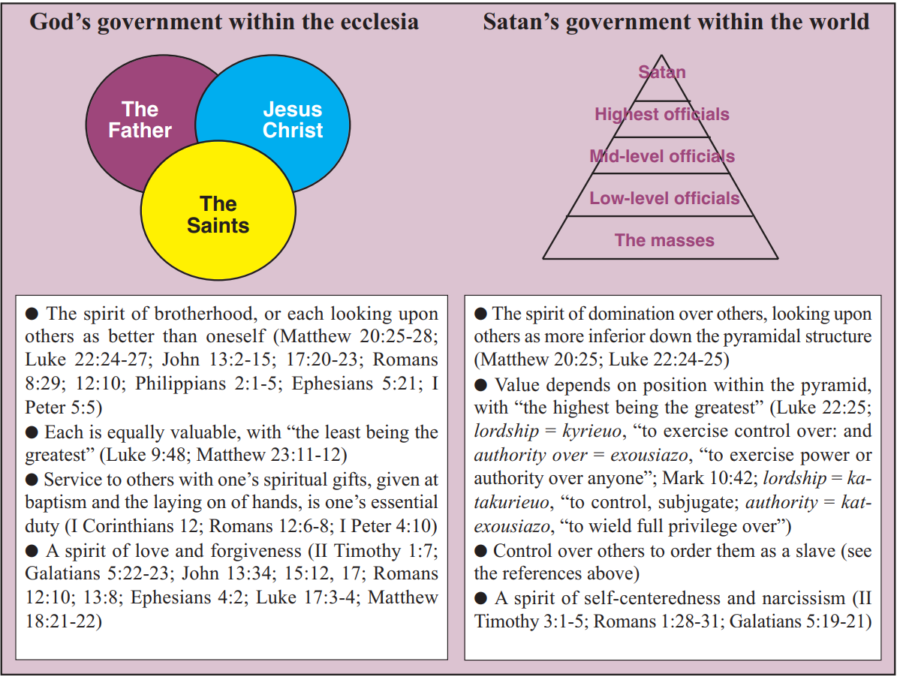
Our True Citizenship
So, we live within a world that is governed by a powerful spirit, an adversary of the Father and Jesus Christ, who desires to force us to follow in his footsteps, contrary to those of our Creator who stated, “He who says he abides in Him [Christ] ought himself also to walk just as He walked” (I John 2:6). Are we to follow this illegal, lawless spirit whose ways lead to destruction and death? When Paul told the Romans, “Let every soul be subject to the governing authorities … and the authorities that exist are appointed by God” (Romans 13:1), did he mean we must therefore do whatever these leaders tell us?
Let us first understand one major thing: Our citizenship is in heaven, with the Father, not on this earth!
“For our citizenship is in heaven, from which we also eagerly wait for the Savior, the Lord Jesus Christ, who will transform our lowly body that it may be conformed to His glorious body, according to the working by which He is able even to subdue all things to Himself” (Philippians 3:20-21).
citizenship = politeuma, “to go back and forth with another”; from politeuomai, “to be a citizen, or live as a citizen; metaphorically, to live with the characteristics of the heavenly community.”
The very word for citizenship as used in Philippians 3:20 is the root for which we get the word politics. The political construct of our lives is to be the governmental community within the ecclesia. That is what defines our conduct, or our “back and forth” interactions with one another that are to be based upon God’s indwelling spirit … the spirit of love, joy, peace, kindness, and humility. That citizenship of ours is in heaven [ouramos, “the abode of God”], not on this earth in an earthly, material setting.
“Now then, we are ambassadors for Christ, as though God were pleading through us: we implore you on Christ’s behalf, be reconciled to God” (II Corinthians 5:20).
ambassadors = presbeuo, “to be an ambassador, or representative of a government; to be an ambassador for Christ involves the experience suggested by the word ‘elder,’ as elder men are chosen as ambassadors”; from presbuteros, “a senior, or old man.”
“… for which I [Paul] am an ambassador [presbeuo] in bonds, that therein I may speak boldly, as I ought to speak” (Ephesians 6:20).
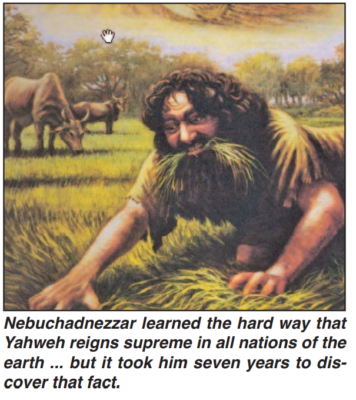
An ambassador to a foreign county is not a citizen of that country, but a citizen of the nation that he represents. For us that is God’s nation, whose capitol is the heavenly Zion where the Father, 24 elders, living creatures, and multitudes of heavenly beings dwell (Revelation 5:6-11). Peter called us “sojourners and pilgrims” on this material earth (I Peter 1:17; 2:11). The Greek word for sojourners is paroikosd, meaning “having a home near, or being an alien resident,” while pilgrims comes from parepidemos, meaning “a resident foreigner.” Our true home is not here in the physical realm, but with our Father and Christ in the spiritual realm. That is why we cannot feel truly comfortable in this world as long as we are in the flesh; this civilization is no longer our true home since being purchased and made white by the blood of the Lamb (I Peter 1:19; Revelation 7:14; 12:11).
Notice too that Jesus, in his last words to the disciples, stated,
“If you were of the world, the world would love its own. Yet because you are not of the world, but I chose you out of the world, therefore the world hates you” (John 15:19).
He also revealed His lack of true attachment to this physical world.
“Foxes have holes and birds of the air have nests, but the Son of Man has nowhere to lay His head” (Matthew 8:20).
We are in the world, but not of it (John 17:14-16). If we are not of this world, then we are of another world … the spirit realm of our heavenly Father.
Dealing With Earthly Governments
Now that we have identified where our true citizenship lies, what can we learn about how we are to interface with the governments of this world? The Scriptures are not silent on this matter.
1. The leaders of nations are put there by the Almighty. This fact may seem incongruous with the knowledge that Satan rules in the nations, but notice what Nebuchadnezzar admitted in Daniel 4:17.
“This decision is by the decree of the watchers, and the sentence by the word of the holy ones, in order that the living may know that the Most High rules in the kingdom of men, gives it to whomever He will, and sets over it the lowest of men.
lowest = shphal, “base, sink down, humiliated.”
Nebuchadnezzar experienced such baseness when he was “hewn down” from his lofty throne, after he had stated, “Is not this great Babylon, that I have built for a royal dwelling by my mighty power and for the honor of my majesty?” (Daniel 4:40). True to the prophecy, his great kingdom, likened to a great tree that reached to the heavens, was chopped down and destroyed. The stump, after seven years of the king’s insanity in the field, regrew once he was humbled and came to understand that the Eternal does according to His will, and no one can restrain Him.
The Eternal installed and brought down the leaders of Israel and Judah. Here are a few examples.
Saul. His selection: “Then Samuel took a flask of oil and poured it on his [Saul’s] head, and kissed him, and said, ‘Is it not because the Lord has anointed you commander over His inheritance?” (I Samuel 10:1).
His rejection: “Because you have rejected the word of the Lord, He also has rejected you from being king”(I Samuel 15:23).
David. His selection: “So he sent and brought him in. Now he was ruddy, with bright eyes, and good-looking. and the Lord said, ‘arise, anoint him; for this is the one! Then Samuel took the horn of oil and anointed him in the midst of his brothers: and the spirit of the Lord came upon David from that day forward” (I Samuel 16:12-13).
Solomon. His selection: “The king also said to them,’Take with you servants of your lord, and have Solomon my son ride on my own mule, and take him down to Gihon. There let Zadok the priest and Nathan the prophet anoint him king over Israel …’” (I Kings 1:33-34).
Jeroboam. His selection: “Then Ahijah took hold of the new garment that was on him, and tore it into 12 pieces. And he said to Jeroboam, ‘Take for yourself ten pieces, for thus says the Lord, the God of Israel, “Behold, I will tear the kingdom out of the hand of Solomon and will give ten tribes to you”‘“ (I Kings 11:30-31).
His rejection: “ … but again he made priests from every class of people for the high places; whoever wished, he consecrated him, and he became one of the priests of the high places. And this thing was the sin of the house of Jeroboam, so as to exterminate and destroy it from the face of the earth” (I Kings 13:33-34).

2. Because the world’s leaders have been put into their positions by the Almighty, they need to be shown respect, even if they don’t deserve it. In most cases they serve to protect the elect.
“Therefore whoever resists the authority resists the ordinance of God, and those who resist will bring judgment on themselves. For rulers are not a terror to good works, but to evil. Do you want to be unafraid of the authority? Do what is good, and you will have praise from the same. For he is God’s minister to you for good. But if yo do evil, be afraid; for he does not bear the sword in vain; for he is God’s minister, an avenger to execute wrath on him who practices evil. Therefore you must be subject, not only because of wrath but also for conscience sake” (Romans 13:2-5).
The New English Bible translates part of verse 3 as, “For government, a terror to crime, has no terrors for good behavior.” The Phillips Translation puts the first part of verse 4 as, “The officer is God’s servant for your protection.” These ideas are seconded by I Peter 2:14 and 3:13.
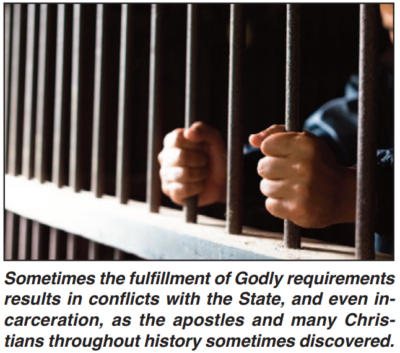
3. If the government authorities attempt to force you to do what is against God’s will, you must resist such efforts and obey the will of God as revealed in His word, or through Divine revelation. Notice what Peter and the apostles said when confronted by the high priest after they had been released from prison, and were told by an angel to preach God’s truth in the temple.
“‘Did we not strictly command you not to teach in this name? and look, you have filled Jerusalem with your doctrine, and intend to bring this Man’s blood on us!’ But Peter and the other apostles answered and said, ‘We ought to obey God rather than man’” (Acts 5:28-29).
Plotting to kill them, the crowds were addressed by Gamaliel, a Pharisee teacher of the law who was respected by everyone. He made clear to the agitated crowd through two examples that leaders who were not motivated by God’s design would die, along with their movement. Then he said,
“‘And now I say to you, keep away from these men and let them alone; for if this plan or this work is of men, it will come to nothing, but if it is of God, you cannot overthrow it — lest you even be found to fight against God!’ And they agreed with him, and when they had called for the apostles and beaten them, they commanded that they should not speak in the name of Jesus, and let them go. So they departed from the presence of the council, rejoicing that they were counted worthy to suffer shame for His name. And daily in the temple, and in every house, they did not cease teaching and preaching Jesus as the Christ” (Acts 5:38-42).
You must not fear the hatred and punishment of those who resist you when you carry out God’s will (II Timothy 1:7; Hebrews 2:14-15). Notice how the apostles stood up to the angry Pharisees, high priest, and others who wanted to kill them for preaching in Jesus’ name, and teaching His ways in the temple and in people’s homes. We must expect resistance from governmental and religious leaders who might lose their following when we stand up for the wonderful true gospel message. In fact, at the end of the age we are told that, “then they will deliver you up to tribulation and kill you, and you will be hated by all nations for My name’s sake” (Matthew 24:9). the governments of man will in some cases attempt to destroy the elect for their staunch and immovable loyalty to Jesus and the Father’s will.
4. If you are forced to act in opposition to the government’s directives, you must accept whatever punishment is dealt out to you, and ask God for deliverance. We just read in Matthew 24:9 that we could be killed for claiming the name of Jesus Christ. We also read how Peter and the apostles were cast into prison, and then almost stoned and finally beaten for preaching Jesus to the people (Acts 5:28, 42). Modern-day disciples must experience the same rejection for standing up to governmental authorities who try to force them to worship men, just as our brethren in ancient times stood up for their Creator. Here is an excellent example.
“Shadrach, Meshach, and Abed-Nego answered and said to the king, ‘O Nebuchadnezzar, we have no need to answer you in this matter. If that is the case, our God whom we serve is able to deliver us from the burning fiery furnace, and He will deliver us from you hand, O king. But if not, let it be known to you, O king, that we do not serve your gods, nor will we worship the gold image, which you have set up’” (Daniel 3:16-18).
The Psalms are replete with songs of deliverance from evil as we read, for example, in Psalm 59:1-2.
“Deliver me from my enemies, O my God; defend me from those who rise up against me. Deliver me from the workers of iniquity, and save me from bloodthirsty men” (see also Psalm 18:48; 69:18; 70:1; 71:2, 4; 119: 134, 153, 170; 143:9).
Yet, in the end we must recognize that the Eternal has our physical and spiritual lives in His hands, and we must not fear what men can do to us.
“And do not fear those who kill the body but cannot kill the soul. But rather fear Him who is able to destroy both soul and body in hell [Gehenna, ‘the Valley of Hinnom near Jerusalem’]” (Matthew 10:28).
“In God I have put my trust; I will not be afraid what can man do to me?” (Psalm 56:11; see also Psalm 118:6).
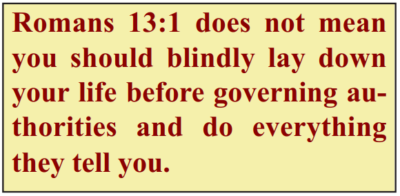
5. Understand that Romans 13:1 does not mean you should blindly lay down your life before governing authorities and do everything they tell you. The verse states,
“Let every soul be subject to the governing authorities. For there is no authority except from God, and the authorities that exist are appointed by God” (NKJV).
subject = hupogasso, “subordinate, obey.”
governing = “to hold oneself above; superior.”
authorities = exousia, “competency, mastery, magistrate, delegated influence.”
appointed = tasso, “to arrange in an orderly manner.”
submit yourselves = hupatosso, “subordinate, obey.”
ordinance = ktisis, “the act of creating, in human actions.
Se also other translations that make Romans 13:1 more clear.
“Let every soul be subject unto the higher powers. For there is no power but of God: the powers that be are ordained of God” (King James Version).
“Let every soul be placed under the protecting powers. For there is no power except from God: and the powers being, were ordered by God” (Smith’s Literal Translation).
“Let every soul unto protecting authorities be in subjection; for there is no authority, save by God, and they that are in being have by God been arranged” (The Emphasized Bible).
A companion Scripture to Romans 13:1 is I Peter 2:13-17.
“Therefore submit yourselves to every ordinance of man for the Lord’s sake, whether to the king as supreme, or to governors, as to those who are sent by him for the punishment of evildoers and for the praise of those who do good. For this is the will of God, that by doing good you may put to silence the ignorance of foolish men — as free, yet not using liberty as a cloak for vice, but as bond servants of God. Honor all people. Love the brotherhood. Fear God. Honor the king.”
We see that both Peter and Paul look upon governing officials as being protectors of those who do good, and should be respected for that function assigned to them by God, who set them in order, for “… the authorities that exist are appointed by God” (Romans 13:1). Yet, we also see in James 4:7 that we are to submit [hupotasso] to God, and resist the devil. Wives are to submit [hupotasso] to their own husbands (Ephesians 5:24), and the brethren are to submit [hipeiko, “yield”] to “those who rule over” [hegeomai, “to lead, to guide”] them. Thus, it is apparent that submission is to be one of love and service to one’s fellow man, not overbearing authoritarianism.
Such is supposed to be the relationship between government authorities and those they are assigned to protect. This is especially true in a constitutional republic as in the United States, where the citizens are the ones in authority, and the government is delegated to protect their God-given rights of life, liberty, and the pursuit of happiness … or property, as the Declaration of Independence should say.
However, Rome at the time of Paul and Peter was not a constitutional republic, but a kingship under strict control of the Caesars. Even so, the authority given to the leaders came from God, as we have seen, and they were supposed to practice love and kindness to others … for that is the very design for civilization that God has planned. Placed in the context of Romans 13:1, then Christians were not to fear the authorities, since they are supposed to be advocates of righteous behavior.
However, the world’s governments of Babylon, Medo-Peria, Greece, and Rome are all called beasts in the book of Daniel. They seized power and ruled harshly with dictatorial control (Luke 22:25), versus God’s systems of government as outlined in I Corinthians 12, Romans 12, Philippians 2, and Galatians 5, for example. These governments of men were selected, not elected by the people, which seems to be the case more and more even in the United States with voter fraud being exposed. Does God command us to submit to the beast of Daniel and Revelation and its anti-Christian rules? Of course not. Are not these evil rulerships a product that Elohim said would result from Israel following the ways of the world, taxing citizens, confiscating land, building a bureaucracy, and raising armies (I Samuel 8:11-18)?
“And the Lord said to Samuel, ‘Heed the voice of the people in all that they say to you; for they have not rejected you, but they have rejected Me, that I should not rule over them’” (I Samuel 8:7)

We must also not forget that our true conflicts rest not with flesh and blood rulers and magistrates in this world. We wrestle against “… principalities, against powers, against the rulers of the darkness of this age …,” against wicked spirits in the heavenly world (Ephesians 6:12). Thus, our battles are not directly with the appointed government magistrates of this world who are supposed to protect us from evil forces, but with the Satanic forces who work behind the scenes to motivate governments to do us harm. These government officials are people like us, and some day will be called to salvation in a future resurrection, so need to be respected. However, when their God-assigned function to protect us is compromised by Satanic influence, we, like Paul and Peter, must firmly “obey God rather than men” (Acts 5:29).
Jesus Christ resisted the ruling authorities of the Judeans and Romans, keeping the Sabbath in the way it was intended, refusing to bow down to the authoritarians of the Sanhedrin, healing the sick, blind, and maimed, and casting out demons. He even taught that the present governments of this world would be overturned, and that He would be its king of the new world order (John 18:37). He was a rebel to man’s governmental systems to the core!
Certainly we ought not support horrible government laws and programs that encourage abortion, homosexuality, gender transition, criminals allowed on the streets, and illegal aliens crossing our borders. Should we submit to these dictates of government? I think not! Moreover, in many ways our government has become an idol to many, providing cradle-to-grave care: Medicare, Medicaid, Social Security, and a host of other programs funded by wealth confiscated from taxpayers.
The context of Romans 13:1 is also critical in understanding its meaning. The verse is sandwiched between calls to love, as it were. Notice that Romans 12:10 speaks of being “… devoted to one another in brotherly love,” while Romans 13:8 speaks of owing “… nothing to anyone except to love one another.” Therefore, the insertion of “Let every soul be subject to the higher powers (KJV, ASV, etc.),” which are appointed by God, has everything to do with our relationship within the ecclesia and to those without. Our “higher powers” are our heavenly Father and Jesus Christ! These higher powers [huperecho exousia] are from God Himself, for there is no authority except from God, for us today and for all people ultimately in the next age.
While it is true that civil government officials need to be respected, for they have a responsibility to protect the saints, we must not fail to perform the will of God in our lives, even if we come into conflict with civil authorities. That is how Christ lived his life; that is how we should live ours.
Remember: Christ said,
“‘Show Me a denarius. Whose image and description does it have?’ They answered and said, ‘Caesar’s.’ And He said to them, ‘Render unto Caesar the things that are Caesar’s, and to God the things that are God’s’” (Luke 20:24-25).
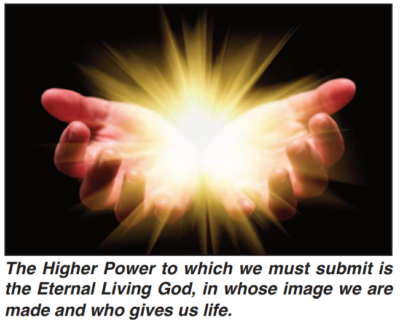
6.We should use our status of citizenship in the country in which we reside as a tool when necessary. Recall how Paul had addressed the unruly crowd in Jerusalem concerning his being struck blind on the road to Damascus, and receiving the commission from God to be a messenger to the gentiles. His message infuriated the crowd and they wanted to stone him. When the Roman commander ordered that Paul be examined under scourging, Paul asked the centurion,”Is it lawful for you to scourge a man who is a Roman and uncondemned’?” (Acts 22:25).
The centurian and commander immediately backed off the scourging, and the next day released him from his bonds and brought him before the chief priests and Sanhedrin. When he was threatened with bodily harm by the Pharisees and Sadducees, the soldiers retrieved Paul from the confusion and brought him to safety. When it was discovered that some of the Judeans were determined to kill him, a contingent of 470 soldiers accompanied him to Caesarea. Eventually he made it to Rome, where he witnessed to many in the Roman government, as well as to the brethren there.
The fact that Paul utilized his earthly citizenship as a tool to accomplish God’s will in his life is a lesson for us. While our citizenship is in heaven, our citizenship defined by an earthly government can be used for our protection and the fulfillment of God’s will. We use that citizenship to be able to drive on the nation’s highways, receive health care, obtain old-age benefits, and receive public education. These benefits are paid for by tax money coerced from the working population, but they are given to the citizens of the nation.
Obedience to Man’s Government
We are, as God’s people, citizens of the heavenly realm. Yet, we live here on earth in the physical realm, and are, according to man’s law, citizens of an earthly nation. We have learned that God has placed certain police, military, and judicial forces in place to protect us from the forces of evil that wish to harm or destroy us … for we wrestle not against flesh and blood, but against wicked spirits in heavenly places (Ephesians 6:12).
While we must be subject [subordinate to] those people God has placed on earth to maintain order amidst the disorder caused by the god of this world (Satan), we follow their rules laid out for our protection as long as they do not conflict with God’s will. As A.E. Knoch states in the Concordant Commentary on the New Testament (Concordant Publishing Concern, Saugun, California, 1968, page 243),
“We must not withstand regularly constituted magistrates, but depend on God to overrule their acts, if they seem to conflict with our duty to God or our convictions of His truth. Our conflict is with the sovereignties and the authorities and the world-mights, the spiritual forces of wickedness among the celestials.”
These magistrates are for our protection, but when they fail in their mission to protect, or attempt to force us into doing evil, we are under no obligation to obey them. The apostles’ cry that “We are to obey God rather than man” must be our battle cry during our sojourn here on earth. We, like Jesus, are here to do the Father’s will.
“I can of myself do nothing. As I hear, I judge; and My judgment is righteous, because I do not seek My own will but the will of the Father who sent Me” (John 5:30).
If the beast system during the end time declares that everyone must keep Sunday rather than the Sabbath in order to buy or sell, we as Sabbath keepers are under no obligation to obey that order. We must take the consequences of whatever Satan’s evil minions might throw at us, even death. We must pray that the Kingdom of our heavenly Father will come to wipe away the horrible influences of the present god of this world (Ephesians 2:2), and that “Your Kingdom come, Your will be done on earth as it is in heaven” (Matthew 6:10).
We need to pray for the magistrates who are placed ”over” us, for they are appointed by God, that they do the right thing, and will be brought to the feet of our heavenly Father in due course. After all, they, like us, are made in God’s image, and in due course will be called and in all likelihood become sons of God, as we are.
Relate to the people in mankind’s government with love, and if we are mistreated by these people, then like Christ when He was nailed to the stake at the crucifixion, may we be able to say, “Father, forgive them, for they do not know what they do” (Luke 23:34)
“Beloved, do not avenge yourselves, but rather give place to wrath; for it is written, ‘Vengeance is Mine, I will repay’, says the Lord. Therefore, ‘If your enemy is hungry, feed him; if he is thirsty, give him a drink; for in so doing you will heap coals of fire on his head.’ Do not be overcome by evil, but overcome evil with good” (Romans 12:19-21).

